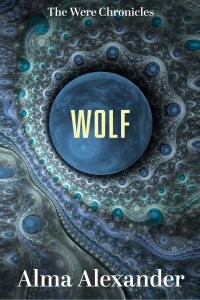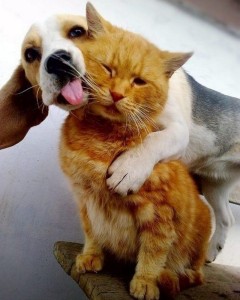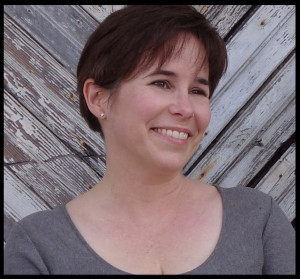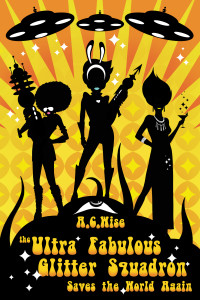
Alma Alexander’s Wolf, out August 21, 2015
Alma Alexander is an internationally published novelist, short story writer and anthologist whose work appears in more than 14 languages worldwide. She has written many different kinds of fantasy – high/epic, historical, contemporary, urban, YA – and occasionally detoured into science fiction when the muse strayed out amongst the stars.
When asked if she imprinted on any particular literary heroine as a child, she said:
I’m almost certain that for a lot of us the kneejerk response to this is the same: Jo March from Louisa May Alcott’s Little Women . She was so iconic, so seminal (not to mention the only one of the sisters with whom I had a remote connection – Meg was the goody two shoes, Amy was a spoiled brat, and Beth was the ghost of a pretty kitten)… and she was a writer, and she pushed on her dream until she got published and many of us who did the same thing eventually ended up identifying with that because that was our dream also. That was something that we – that I – grew up looking up to, waiting to accomplish. But I didn’t want to be Jo. I just wanted to be a writer.
. She was so iconic, so seminal (not to mention the only one of the sisters with whom I had a remote connection – Meg was the goody two shoes, Amy was a spoiled brat, and Beth was the ghost of a pretty kitten)… and she was a writer, and she pushed on her dream until she got published and many of us who did the same thing eventually ended up identifying with that because that was our dream also. That was something that we – that I – grew up looking up to, waiting to accomplish. But I didn’t want to be Jo. I just wanted to be a writer.
I don’t think that I ever “pretended” to be someone else. My best recollections point to my wishes being more aligned with being the best me I could be. Using the convenient metaphor of Narnia, I never wanted to be or pretended to be Lucy or Susan. What I wanted was to be found worthy of being a true friend of Aslan, who was Not A Tame Lion, when judged for myself, in my own right.
Can you remember what it was Jo did or what qualities she had, besides being a writer, that captured your affections and your imagination so strongly?
It wasn’t the pretty. It wasn’t the nobility. What always drew me in were strength and wits and smarts and the occasional spark of true wisdom. That was what the best protagonists carried within them and that was what I sought within myself if I ever thought about wanting to emulate them. I wept with them when hard choices had to be made, and they made them; I laughed with them in delirious joy when risks were rewarded; I held my breath as they did during the moments when outcomes were hanging by the thinnest of threads. Strength, wits, smarts, and wisdom. If they could shoot a straight arrow, all the better – for them – but it didn’t make me want to go out and buy a bow and start practicing archery (well, I shot a bow and arrow and I wasn’t bad at it when I did, but eh, you know what I mean). What I was looking for was… was resilience, an ability to bend in the wind like
a reed by the river if that was needed but to spring back up straight and true after the storm was over. I never thought vulnerability was a weakness, nor tears, nor taking a moment to draw a deeper breath – but they could not be allowed to be the last thing that was there. There had to be Strength. Wits. Smarts. And Wisdom.
How does she compare to the female characters in your work? Is she their literary ancestor? Do they rebel against all she stands for? What might your creations owe her?
In terms of debts, in that context, everything – my characters owe everything to that philosophy. I have never been afraid to put them through the wringer in any story I ever wrote because any heroine who stepped forward had those qualities. I think of Xaforn of the Guard, from The Secrets of Jin-shei , who lived and died for honor and for love – and of her jin-shei sister, also; I think of Amais who returned to Syai four hundred years after the events of The Secrets of Jin-shei
, who lived and died for honor and for love – and of her jin-shei sister, also; I think of Amais who returned to Syai four hundred years after the events of The Secrets of Jin-shei , and of her friend Xuelian, who carry the weight of the world on their shoulders in Embers of Heaven
, and of her friend Xuelian, who carry the weight of the world on their shoulders in Embers of Heaven ; I think of Olivia from Midnight at Spanish Gardens
; I think of Olivia from Midnight at Spanish Gardens , and Anghara of Changer of Days
, and Anghara of Changer of Days , and Thea of the Worldweavers series and Jazz, my ‘youngest’, the protagonist of Random
, and Thea of the Worldweavers series and Jazz, my ‘youngest’, the protagonist of Random . They were all shaped by those tenets, they all had to live according to those criteria. They had to know the odds, and be willing to go against them if that was necessary; they had to know fear, and fly in the face of it anyway; they had to recognize the stinging nettle and reach out to grasp it anyway if the need arose.
. They were all shaped by those tenets, they all had to live according to those criteria. They had to know the odds, and be willing to go against them if that was necessary; they had to know fear, and fly in the face of it anyway; they had to recognize the stinging nettle and reach out to grasp it anyway if the need arose.


Everything I have ever read has built up to these heroines and all that they are. My heroines may not be part of a better world, as such, but the things that they do and that they are help make their worlds better. That is all I can ever ask of them. So far, none have let me down.
How do you feel about the word heroine? In these posts, I am specifically looking for female authors’ female influences, whether those women they looked up to were other writers or Anne of Green Gables. Does the word heroine have a purpose that isn’t served by equally well by hero?
I have no problem with the concept of a heroine, as such – but I think of the characters who carry my stories as my protagonists, as my people. I don’t know that I hold with “hero” as a solitary shining figure standing off by him or herself anyway. We are all a part of the fabric. Some of us are just given a moment in which we shine harder than those standing next to us – and if we step into that light, we
are heroes.
_________________________________
Alma lives in the Pacific Northwest, in the cedar woods, with her husband and two obligatory cats. Her website is here and she Tweets, is on Facebook, and has been even known to pin stuff.
_________________________________
About this post: The Heroine Question is my name for a series of short interviews with female writers about their favorite characters and literary influences. Clicking the link will take you to all the other interviews, or there’s an index of them here.
) in 1984, going full-time as a writer in 1988, the year of his marriage to Janet Moore of Milford, Massachusetts, who he met, wooed and proposed to at successive World Fantasy Conventions.
(June, 2015) and The Desert and the Blade
(Sept. 2015); next is PRINCE JOHN (Sept. 2016), all from Roc/Penguin.
; I think she’d get along with both of them. And Father Ignatius from the same series. The rest are possibly too much of the headbanger type.






 Fran Wilde’s first novel,
Fran Wilde’s first novel, 




